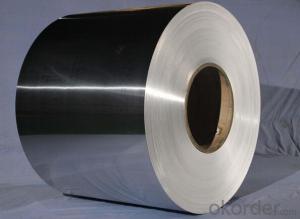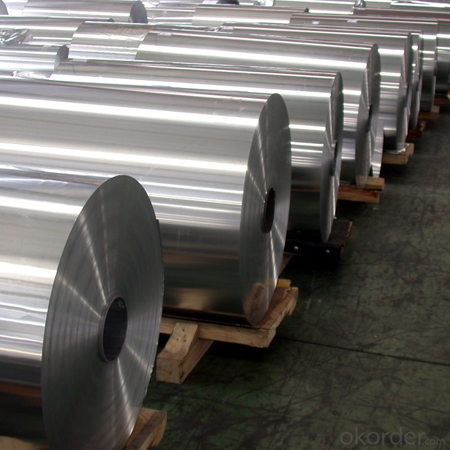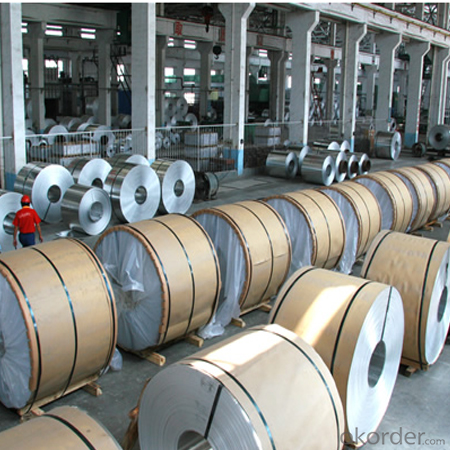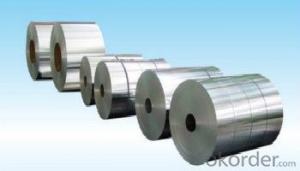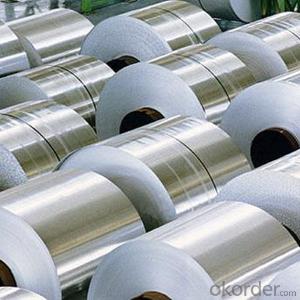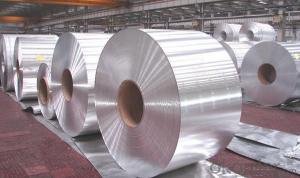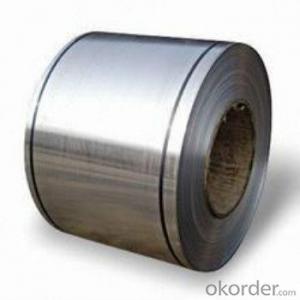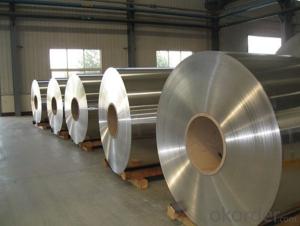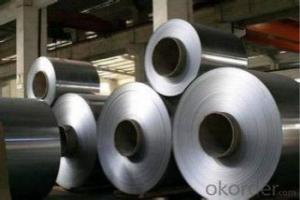Powder Coated AA3003 H12 Mill Finished Aluminum Coil - China Supply
- Loading Port:
- Shanghai
- Payment Terms:
- TT OR LC
- Min Order Qty:
- 5 m.t.
- Supply Capability:
- 10000 m.t./month
OKorder Service Pledge
OKorder Financial Service
You Might Also Like
Specification
1. Specification of AA3003 H12 Mill Finished Aluminum Coil China Supply
Material | Alloy Aluminum 6063,6061,6005 or customer nominated |
Temper | T3, T4, T5, T6 |
Surface | Anodize, electrophoresis, powder coating, PVDF coating, wood grain painting, matted, etc. |
Colour | Any colour based on Standard Germany RAL Mark |
Length | Coating 6.5 meters, Anodizing 6.5 meters, Mill finish 5 meters |
Press Machine | 500-4000 tons all together 64 press lines. |
Fabrication | 1. Windows and doors; 2. Drilling; 3. Bending; 4. Cutting; 5. etc. |
Certificate | ISO 9001 |
Moulding | 1. Using our moulds, no fee; |
2. Using customer drawing, opening mould, usually about 10~50 tons then the moulding can be refunded. | |
3. Mould cost is negotiable base on the order quantity | |
Capability | Annual output 100,000 tons |
2. Application of AA3003 H12 Mill Finished Aluminum Coil China Supply
(1).Interior: wall cladding, ceilings, bathrooms, kitchens and balconies, shutters, doors...
(2).Exterior: wall cladding, facades, roofing, canopies, tunnels,column covers , renovations...
(3).Advertisement: display platforms, signboards, fascia, shop fronts...
3. Feature of AA3003 H12 Mill Finished Aluminum Coil China Supply
*Such coil is specially designed to replace aluminum ingot, due to the high export tax of aluminum ingot, the coil has better price than ingot.
*This type of coil can fit customer's remelting furnace just like ingot, no need to make any change to the production line that was previously used for ingot. The standard coil size and weight is very suitable for the feed gate of furnace.
*This type of coil causes less material wastage than ingot when remelted.
*Our coil is made directly from ore, no need to go though the ingot making process, quality is much better than other suppliers who use ingot scrap to make coil.
Be free from Oil Stain, Dent, Inclusion, Scratches, Stain, Oxide Dicoloration, Breaks, Corrosion, Roll Marks, Dirt Streaks and other defect which will interfere with use
4. Certificate:
SGS and ROHS(if client request, paid by client), MTC(plant provided), Certificate of Origin(FORM A, FORM E, CO), Bureau Veritas and SGS (if client request, paid by client), CIQS certificate
5. Image of AA3003 H12 Mill Finished Aluminum Coil China Supply
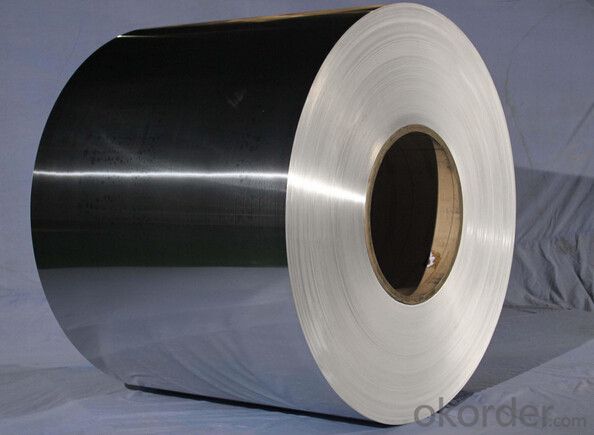
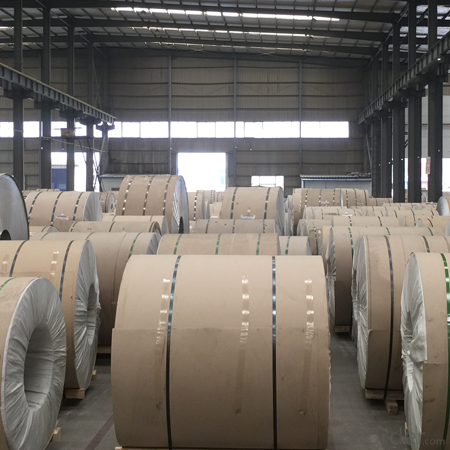
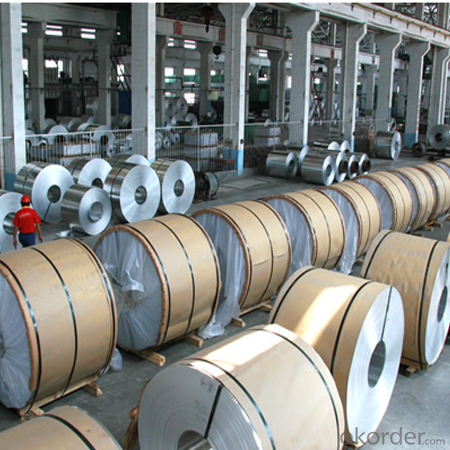
6. Package and shipping of AA3003 H12 Mill Finished Aluminum Coil China Supply
eye to wall
eye to the wall
with wood pallet (wooded case also available)
7. FAQ
1) What is the delivery time?
Dpends on actual order, around 20 to 35 days
2)What is the QC system:
We have QC staff of 20 persons and advanced equipment, each production is with MTC traced from Aluminum ingot lot.
3) What market do you mainly sell to?
Australia, America, Asia, Middle East, Western Europe, Africa etc
- Q: I am wondering if a deodorant made with aluminum silicate is safer than one with aluminum salt.
- aluminum silicates have been used in deodorants for years. there was a time when it was thought that the Al in the deodorants was causing alzheimers but that has been shown to be wrong. if there are other dangers to the silicates, we haven't found them or they aren't that bad
- Q: I want to separate the copper and aluminum so I will get more at the scrap yard for my radiators any one know of an easy way to do this? Thanks
- Does your scrapyard not have a good price for aluminum/copper radiators? Mine does. I Don't think you can separate them short of melting off the aluminum. The copper goes right through it. It would be a lot of work to separate them. Much more work than stripping copper wire. Before I take a load of scrap, I call all of the yards and get the best price. Sometimes this varies as much as $.50/pound on copper and radiators and brass and clean aluminum. Work with your phone, it will make you money. Last I checked, #1 copper 3.10/pound #2: 2.90, Radiators $1.50, Brass $1.40, Insulated copper wire $1.10 to $.90 Aluminum $.85 to $.55 dependingScrap Metal(steel). $9.00/100 Lets recycle Car batteries are $6 ea.
- Q: How are aluminum coils used in HVAC systems?
- Aluminum coils are used in HVAC systems for their efficient heat transfer capabilities. They are typically used in air conditioning units and heat pumps to cool or heat the air that circulates through the system. The coils play a crucial role in the refrigeration cycle by absorbing heat from the indoor air and releasing it outside. The lightweight and corrosion-resistant properties of aluminum make it an ideal material for these coils, ensuring efficient and reliable performance in HVAC systems.
- Q: How are aluminum coils protected during shipping?
- To guarantee the safety of aluminum coils during shipping and prevent any potential harm, various methods are employed. One frequently used approach involves the utilization of protective packaging materials, such as bubble wrap, foam, or corrugated cardboard, which are employed to envelop the coils. This wrapping creates a cushioning effect that absorbs any impact or vibration that may occur during transportation. In addition to these protective packaging materials, aluminum coils are often placed within robust shipping containers or crates. The design of these containers aims to provide enhanced security and stability during transit, thereby minimizing the risk of the coils being jostled or bumped. Furthermore, to maintain the coils' integrity and decrease the possibility of damage caused by friction with other objects, strapping or banding is frequently employed to secure the coils and prevent any shifting or movement during transportation. Moreover, shipping companies may also employ air-bag systems or dunnage bags to fill any empty spaces within the shipping container. This additional measure further reduces movement and adds an extra layer of protection for the coils. In summary, the protection of aluminum coils during shipping involves a combination of packaging materials, secure containers, and preventive measures to ensure their safe arrival at their intended destination.
- Q: Can a digital caliper be utilized to accurately measure the diameter of an aluminum coil?
- <p>Yes, you can use a digital caliper to measure the diameter of an aluminum coil accurately. Digital calipers are precise measuring tools, often accurate to 0.001 inches or 0.02mm, which is suitable for measuring the diameter of various objects, including aluminum coils. Ensure the caliper is zeroed before use and that the coil's surface is clean and flat where the measurement is taken to get accurate readings.</p>
- Q: I have a aluminum sign that I store in the garage and it got a couple specks of rust on it which I don't like because I use it for my DJ shows. How can I get rid of the rust before it gets too bad without painting over it?
- being aluminium it should not rust at all! if it is mill or polished try some very fine steel wool or some type of metal polish should do the trick.
- Q: This question asks for methods to take care of and preserve aluminum coils, ensuring their longevity and functionality.
- <p>To maintain aluminum coils, follow these steps: Keep them clean by wiping off any dust or debris. Store them in a dry environment to prevent corrosion. Avoid stacking heavy objects on top to prevent deformation. Regularly inspect for any signs of damage or wear. Use appropriate handling equipment to avoid scratches or dents. Apply a protective coating if exposed to harsh conditions. Ensure proper ventilation during storage to prevent condensation. By following these practices, you can prolong the life and maintain the quality of aluminum coils.</p>
- Q: Why does the coated aluminum coil have thickness requirement for membrane?
- The purpose of coating is to protect the surface of aluminum coil and make it more aesthetic. The thickness of membrane is closely related to the keep years of products made by aluminum coil.
- Q: What are the potential applications of colored aluminum coils?
- Colored aluminum coils have a wide range of potential applications across various industries. One of the main uses is in the construction sector, where colored coils can be used for both functional and aesthetic purposes. They can be applied as roofing material, siding, or decorative elements on buildings, providing protection against weather conditions while also enhancing the visual appeal of the structure. Another potential application is in the automotive industry, where colored aluminum coils can be used for manufacturing car body panels. The vibrant colors and durability of the material make it an attractive option for creating stylish and long-lasting exteriors for vehicles. Colored aluminum coils also find application in the electronics and electrical industries. They can be used to create casings for electronic devices, such as smartphones, tablets, and laptops, adding a visually appealing touch to these gadgets. Additionally, the lightweight nature of aluminum makes it a suitable choice for heat sinks and other cooling components in electronic devices. In the packaging industry, colored aluminum coils can be utilized for creating eye-catching packaging materials for various products. The vibrant colors and sleek appearance of aluminum can help to enhance the shelf appeal of consumer goods, attracting potential buyers. Furthermore, colored aluminum coils can be utilized in the furniture industry for creating modern and stylish furniture pieces. The versatility of aluminum allows for the production of unique designs and shapes, adding a contemporary touch to interior spaces. Lastly, colored aluminum coils can be employed in the signage and advertising industry. They can be used for creating custom signage, billboards, and promotional displays with vibrant and long-lasting colors, making them an effective marketing tool. Overall, the potential applications of colored aluminum coils are vast and diverse, spanning across industries such as construction, automotive, electronics, packaging, furniture, signage, and advertising. The durability, lightweight nature, and aesthetic appeal of colored aluminum coils make them a versatile material for a wide range of purposes.
- Q: How do aluminum coils perform in coastal areas with high salt content?
- Aluminum coils generally perform well in coastal areas with high salt content due to their corrosion-resistant properties. The protective oxide layer on the surface of aluminum helps to resist the corrosive effects of salt air and prevent the formation of rust. However, regular maintenance and cleaning are still recommended to ensure optimal performance and longevity of the aluminum coils in such environments.
Send your message to us
Powder Coated AA3003 H12 Mill Finished Aluminum Coil - China Supply
- Loading Port:
- Shanghai
- Payment Terms:
- TT OR LC
- Min Order Qty:
- 5 m.t.
- Supply Capability:
- 10000 m.t./month
OKorder Service Pledge
OKorder Financial Service
Similar products
Hot products
Hot Searches
Related keywords
